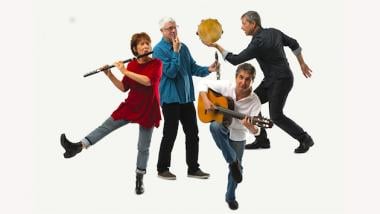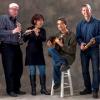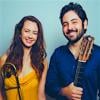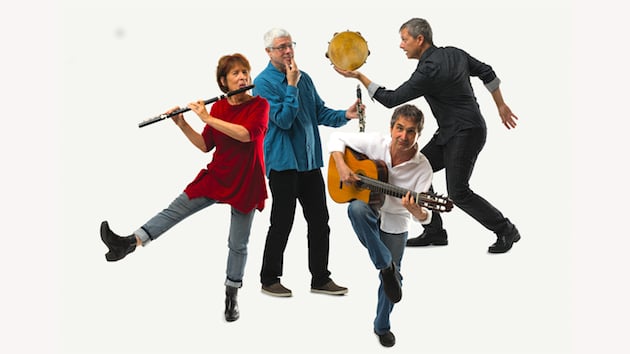
The Bay Area wasn’t always a hotbed of Brazilian culture.
Compared to Los Angeles and New York City, the region was relatively late in nurturing a scene where Brazilian-born musicians and non-Brazilian players besotted with the country’s musical riches could connect and collaborate. But over the past 25 years, the Bay Area has forged deep and enduring ties to Brazil, connections that manifest with particular density this time of year via a confluence of events, some annual and some ad hoc.
It’s not just the avid audience that ensures Brazilian superstars include Bay Area dates on North American tours, like pianist/composer Ivan Lins, who brings his expansive book of hits and standards to Yoshi’s on Aug. 15–16. Musicians of all stripes, but particularly players versed in jazz, have immersed themselves in various Brazilian styles beyond the bossa novas that entered the standard repertoire in the 1960s, particularly choro, samba, forró, and MPB (música popular brasileira). What’s not always apparent are the institutions and individuals responsible for fostering these connections.
No organization has played a more important role in fostering the Bay Area Brazilian scene than California Brazil Camp, which was founded by Dennis Broughton in 1998. Bringing together master Brazilian musicians and dancers with professional and amateur artists for almost round the clock classes and jam sessions, the confab is tucked away in Cazadero between Aug. 18–31.
Relationships forged in the redwoods often lead to new ensembles, recordings, and projects. And many faculty members end up performing around the West Coast, like the Aug. 24 concert at the California Jazz Conservatory (CJC) featuring the guitarist, vocalist, and composer Guinga, one of Brazil’s most revered and distinguished composers, and the exquisite vocalist Monica Salmaso, who hasn’t played in the Bay Area for more than a decade.
Other Brazil Camp faculty members aren’t well known in North America, but they’re elite musicians who shape and define musical currents back home. On Aug. 25, the CJC presents guitarist Pedro Martins and bassist Michael Pipoquinha, a duo of brilliant twentysomething virtuosi hailed as their generation’s leading instrumental innovators.
Oakland flutist/vocalist Rebecca Kleinmann started attending Brazil Camp in 2001, after an encounter with Rio-born pianist Marcos Silva (more on Silva’s essential role on the Bay Area scene later). Upon discovering her growing love of Brazilian music, he insisted that she check it out. “I looked it up and I went and it was amazing,” says Kleinmann, who introduces a new collaboration with vocalist Tiffany Austin at Oakland’s Piedmont Piano Company on Sept. 14.
“I was already loving Brazilian music, but Cazadero was such a playground. I love that there’s dance and music. I can get into the music physically, sing, and play percussion. You have a lot of different styles, Brazilian jazz, choro, and I really fell in love with forro there. You can study the basics, but there are also genius masters. A lot of the musicians studying are full blown professionals who’ve also fallen in love with Brazilian music. You get to hang out with Guinga and hear him tell dirty jokes, if you speak Portuguese. He’ll play a Duke Ellington tune and cry because he’s so in love with it.”
In recent years the Yerba Buena Gardens Festival has presented a Brazil Camp showcase, and 2019’s free Brazil in the Garden concert takes place on the afternoon of Aug. 18 featuring acclaimed São Paulo vocalist Fabiana Cozza, who’s making her California debut. Her latest album Partir connects Afro-Brazilian music with kindred African styles in Cape Verde, Congo and Angola, and she’s joined by a stellar cast of São Paulo players including percussionist Douglas Alonso and Henrique Araujo on ukulele-like cavaco and bandolim (mandolin).
Renowned flutist/pianist/composer Léa Freire and pianist/composer Amilton Godoy, a creative force since he co-founded the influential samba jazz combo Zimbo Trio in the 1960s, are also on faculty at Brazil Camp this summer. They usually perform as a duo but are working with Berkeley reed expert Harvey Wainapel in the San-São Trio, which recently released the gorgeous album Novos Caminhos. Like Kleinmann and vocalist Sandy Cressman, guitarist Brian Moran, percussionist Ami Molinelli, and a handful of other American-born musicians in the Bay Area, Wainapel has collaborated widely with Brazilian musicians across a number of different idioms.
San-São Trio combines jazz improvisation and Brazilian rhythms and song forms in a chamber music setting, a body of original work they present at a series of house concerts and gigs, including Aug. 18 at Albany’s St. Alban’s Episcopal (where Freire and Godoy join the Berkeley Choro Ensemble with Wainapel, flutist Jane Lenoir, percussionist Brian Rice, and Rio-born guitarist Ricardo Peixoto). The trio also plays Chez Hanny in San Francisco on Aug. 25 and Oakland’s Piedmont Piano on Sept. 1.
“They’re two heavyweights and very important figures in Brazilian music,” says Wainapel, who has made more than a dozen extended trips to Brazil since the turn of the century. “They opened up their duo arrangements for another woodwind voice on Lea’s brilliant compositions. Amilton’s role is very heavy. He’s the orchestra and rhythm section. Every time I listen to him or the CD, I hear more details how astounding he is.”
In a natural collaboration between complimentary institutions, Brazil Camp faculty perform on Aug. 24 at Berkeley’s BrasArte, another arts organization that’s played a central role in nurturing Brazilian culture in the Bay Area. Founded by dancer and choreographer Conceição Damasceno and located for nearly two decades in a nondescript cinderblock building on San Pablo Avenue, the cultural center offers classes in capoeira, Afro-Brazilian dance and music throughout the year. The Aug. 24 concert is billed as Brazil Camp Samba Night with Ailton Nunes, Ronaldo Andrade, Jorge Alabe, Francisco Marques, and others.
A Brazil Camp faculty ensemble will also be on hand on Sept. 1 for BrasArte’s annual festival marking Brazilian Independence Day with a Lavagem. The celebration is inspired by the traditional Salvador da Bahia blessing ceremony that culminates on the steps of the Church of Nosso Senhor do Bonfim after a long percussion-powered procession through the city, which is the heart of Afro-Brazilian culture.
The theme of this year’s festival is “Great women of Brazilian Popular Culture,” a lineage embodied by Salvador axé star Margareth Menezes, who’ll perform a short set on the indoor stage with her percussionist. Honoring two recently departed giants, Beth Carvalho and João Gilberto, the event opens in the morning with free dance classes and features afternoon performances on the main stage. The Lavagem procession and blessing takes place at 2 p.m.
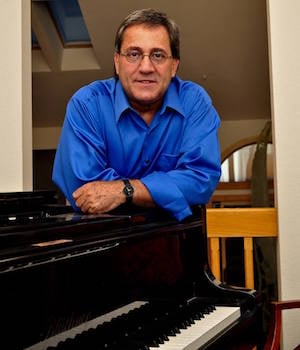
No Brazilian musician has bestowed more gifts upon the Bay Area music scene than pianist/composer Marcos Silva, who has inculcated hundreds of musicians into Brazilian music’s rhythmic and melodic intricacies as a founding faculty member at the California Jazz Conservatory. He initially made his mark as an ace accompanist, first in Rio and then New York City (where he first met Harvey Wainapel, who credits Silva with sparking his love affair with Brazilian music).
A two-decade run as music director for Flora Purim and Airto gave him international stature, but Silva has largely stayed off the road since launching the CJC’s Brazilian music program in 1996 (when it was known as the Jazzschool). The official position amplified his already pervasive influence on a Bay Area scene studded with his former mentees, like Sandy Cressman, who’s become a creative force in her own right with her heavyweight collaborations on her 2018 album Entre Amigos.
With more than three decades of teaching under his belt, Silva has trained several generations of American musicians fully equipped to play Brazilian music with Brazilians on their own turf. Bassist Scott Thompson was exposed to Silva’s keyboard work in utero, as his mother, saxophonist Mary Fettig, was playing in the pianist’s band when she was pregnant. His earliest memory as a toddler is Silva’s group performing with the great Brazilian guitarist/composer Toninho Horta (who’s also on faculty at Brazil Camp this year).
Thompson was already a serious jazz musician at 15 when he started taking Silva’s Jazzschool class. “I was about 15 and he recommended I go to Brazil Camp in Cazadero,” the bassist recalls. He wasn’t 20 yet when Silva called him to sub on a gig. He’s been working with him ever since, and regularly gets called to perform in Brazil with major artists such as Horta, guitarist Chico Pinheiro, and the samba jazz quartet led by the mother and daughter team of Debora and Dani Gurgel (on piano and vocals, respectively).
Silva’s “mentorship was huge for me, but I see his impact throughout the Bay Area,” Thompson says. “A lot of what happens in the Brazilian music scene wouldn’t happen if not for Marcos.”

